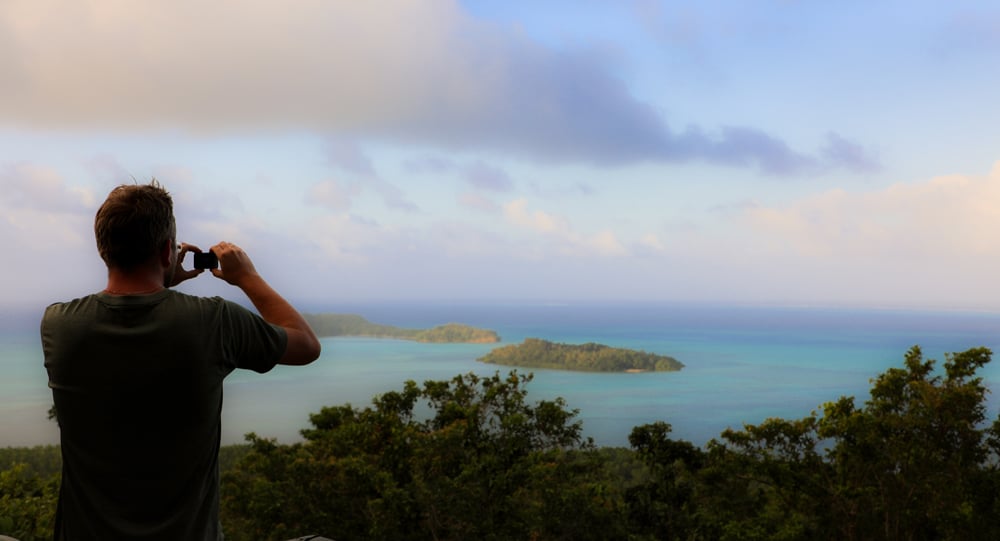News
Palau aims to become first Carbon Neutral Tourism Destination

 Project to make Palau a carbon neutral destination launched by Palau Bureau of Tourism, Sustainable Travel International, and Slow Food.
Project to make Palau a carbon neutral destination launched by Palau Bureau of Tourism, Sustainable Travel International, and Slow Food.
The Palau Bureau of Tourism, Sustainable Travel International, and
Slow Food have launched a new project in Palau that aims to mitigate the tourism sector’s carbon footprint and establish Palau as the world’s first “Carbon Neutral Tourism Destination.” The project is taking an innovative destination-level approach that includes promoting local food production within tourism and developing a carbon management program for tourists. This project supports the objectives of the Coalition of Fragile Ecosystems (COFE) and International Cooperation and Development Fund (TaiwanICDF) and has been endorsed by various government agencies, including Palau’s Ministry of Natural Resources, Environment and Tourism; Ministry of Community and Cultural Affairs; Ministry of Education; the Our Oceans
2020 Organizing Committee; and the Office of the President.
Known for its unspoiled natural beauty and pristine seas, the Pacific Island nation of Palau is regarded as one of the top marine tourism destinations in the world. Last year, more than 89,000 international tourists visited the country, which has a population of just under 22,000. As such, tourism represents the islands’ main source of economic income and employment.
As a small island destination, Palau is extremely vulnerable to the impacts of climate change, which threaten the islands’ marine ecosystems, coastal communities, and tourism industry.
While tourism is the economic lifeblood of the island, it also contributes to the climate crisis. Tourists are responsible for a significant portion of Palau’s carbon footprint as they travel to the remote island by plane and consume food imported from overseas.
In recent years, Palau has taken extensive measures to further environmental protection and responsible tourism. This includes establishing one of the world’s largest marine sanctuaries; creating the world’s first mandatory eco-pledge (Palau Pledge) that all visitors are required to sign upon entry; banning tour operators from utilizing single-use plastics and styrofoam; and protecting its marine environment through the adoption of the world’s strictest national sunscreen standard. This bold new initiative, which is being led by Sustainable Travel International, builds upon the country’s past efforts to specifically address the tourism sector’s climate impact.
This project will reduce the carbon footprint of tourism in Palau by increasing the proportion of food that is sourced from local producers and reducing the industry’s dependence on imports. Among other activities, the project will accomplish this by celebrating the islands’ gastronomic heritage and building the capacity of farmers and fishers to market their products to tourists. Along with combating climate change, this will create income-generating opportunities for local communities and improve food security on the islands. A specific emphasis will be placed on sustainable production and empowering women producers to participate in the tourism value
chain.
To compensate for tourism’s unavoidable emissions, the project will develop a first-of-its-kind carbon management program for tourists to Palau. The new online platform will allow visitors to calculate and offset the carbon footprint associated with their trip, including both their travel to
and activities in Palau. In line with Palau’s leadership in marine conservation, the offset contributions will be invested in blue carbon initiatives, such as mangrove restoration, or sustainable production activities in the region that reduce CO2 emissions. It is estimated that
this program has the potential to raise over USD $1 million a year for these carbon reduction initiatives.
“If the current COVID-19 crisis has taught us anything, it’s that we must strengthen our nation’s resilience to external threats – the greatest of which is climate change,” said Kevin Mesebeluu, Director of the Palau Bureau of Tourism. “Palau is blessed with some of the world’s most pristine natural resources, inherited through culture and tradition, and placed in our trust for the future generation. We must work to actively protect them, while also investing in our people. Palau embraces sustainable tourism as the only path forward in the new era of travel, and we believe that our destination can and must be carbon neutral.”
“This project has enormous potential to transform the traditional tourism model and is a notable step towards lessening the industry’s climate impact. Destinations around the world face these same challenges of balancing tourism growth with environmental protection. Carbon neutrality is the future of tourism and the direction that all destinations must head as they recover from COVID-19. We commend Palau for their continued leadership, and hope this inspires other destinations to strengthen their own climate resilience strategies,” said Paloma Zapata, CEO of Sustainable Travel International.
“The rapid growth of an unsustainable tourist industry based on broken food systems has been a key driver of the climate crisis and ecosystem destruction. This project represents the antithesis, a solution that strives to strengthen and restore value to local food systems, reduce the cultural and environmental damage caused by food imports, and improve the livelihoods of food producers both in Palau and beyond,” said Paolo di Croce, General Secretary of Slow Food International.
Project updates will be shared regularly on www.sustainabletravel.org
Gear News
Introducing the TR-80, IR-50 and CS-30 Regulators from DYNAMICNORD

Whether you are a beginner or a professional diver – with the three new main regulators from DYNAMICNORD, everyone will find their favourite regulator. They all look super stylish.
Excellent performance with the TR-80
Quality and performance are the be-all and end-all for regulators. It is not for nothing that the TR stands for Tec Reg. The innovative design of the TR-80 guarantees absolute reliability – even in ice-cold waters.

Perfect breathing effort at 0.8 J/l / certified for diving in waters below 10 degrees / structural design made of solid brass for best cold protection / membrane-compensated design with dry seal of the first stage / reduced exhalation effort thanks to optimized exhalation membrane and bubble deflector / adjustable Venturi (dive/predive) and adjustment knob for individual inhalation comfort / innovative design of the front cover prevents free-flow in strong currents or when diving with scooters / design made of sandblasted brass, matt chrome finish / 2 HP and 4 LP outlets / mouthpiece made of high-quality, anti-allergic silicone for maximum comfort.


Amazing underwater adventures with the IR-50
The IR-50 is the top regulator for advanced and experienced divers. Natural breathing is the essence of this regulator.

Ideal breathing effort at 0.8 J/l /certified for diving in waters below 10 degrees / compensated membrane / adjustable venturi (dive/predive) and adjustment knob for individual inhalation comfort/ outlet valve and deflector for minimum exhalation effort and reduction of bubbles on the face / design made of sandblasted brass, matt chrome finish / 2 HP and 4 NP outlets / mouthpiece made of high-quality, anti-allergic silicone for maximum comfort.


The Workhorse – our CS-30
For diving centres and diving beginners – the workhorse stands for strong construction, reliability and robustness. Perfect for your training.

Optimal breathing effort at 0.8 J/l /recommended for diving in waters above 10 degrees / non-compensated piston / adjustable venturi (dive/predive) / outlet valve and deflector for minimum exhalation effort and reduction of bubbles on the face / design made of sandblasted brass, matt chrome finish / 1 HP and 3 NP outlets / mouthpiece made of high-quality, anti-allergic silicone for maximum comfort.


Octopus OP-30
The OP-30 is the ideal addition to all DYNAMICNORD regulators. It is identical in construction to the CS-30.

The TR-80, IR-50, CS-30 (DIN & INT) regulators and the Octopus OP-30 are available from DYNAMICNORD dealers and in the online store.
DYNAMICNORD – Your Outdoor Companion.
Marine Life & Conservation
Paul Watson Released as Denmark Blocks Japan’s Extradition Bid

Renowned anti-whaling activist Paul Watson has been released from custody in Greenland after spending five months in detention. Denmark’s Justice Ministry rejected Japan’s request for his extradition, citing insufficient guarantees that his time already served in custody would be credited against any potential sentence.
The 74-year-old Canadian-American was arrested on July 21 in Nuuk, Greenland’s capital, when his ship docked to refuel. His arrest was based on a 2012 Japanese warrant related to a 2010 encounter in Antarctic waters. Japan alleged Watson obstructed operations and caused damage to a whaling research ship during efforts to disrupt illegal whaling. Watson has consistently denied these claims, maintaining his commitment to marine conservation.
Denmark, which oversees extradition matters for Greenland, concluded that while the legal conditions for extradition were met, the lack of assurances from Japan regarding time-served credit made extradition untenable.
In a video shared by his foundation, Watson expressed gratitude and relief, saying, “After five months, it’s good to be out… and good to know they’re not sending me to Japan.” He added that the most difficult part of his time in custody was being separated from his two young sons.
Watson is a pioneering figure in marine conservation, known for founding the Captain Paul Watson Foundation in 2022 after decades of activism with the Sea Shepherd Conservation Society. His bold efforts to defend marine life have earned him widespread support, including from celebrities and conservationists. His work has also been featured in the acclaimed reality TV series Whale Wars.
Watson’s lawyer, Jonas Christoffersen, praised the decision, stating, “We are happy and relieved that Paul Watson is now free.” He added that Watson is eager to reunite with his family and continue his vital work.
The arrest occurred while Watson’s vessel, the M/Y John Paul DeJoria, was en route to the North Pacific with a team of 26 volunteers to intercept a Japanese whaling ship. His foundation described the arrest as politically motivated and emphasized that Watson’s actions were focused on ending illegal whaling practices.
Japan resumed commercial whaling in 2019 after leaving the International Whaling Commission, asserting that whale meat is a cultural tradition. Conservationists, however, continue to challenge these practices, highlighting their impact on marine ecosystems.
Despite the challenges, Watson remains steadfast in his mission to protect marine life and bring attention to whaling practices. His dedication to ocean conservation has made him a globally respected advocate for the environment.
-

 News2 months ago
News2 months agoIconic SS United States to become the World’s Largest Artificial Reef
-

 News3 months ago
News3 months agoBook Review – 52 Assignments: Underwater Photography
-

 Gear News3 months ago
Gear News3 months agoDYNAMICNORD – New German diving brand enters the British market
-

 News3 months ago
News3 months agoExploring Cenote El Pit: A Diver’s Dream
-

 Gear News3 months ago
Gear News3 months agoTry BARE drysuits (and maybe even win one!) this Friday with Sea & Sea at North West Dive Fest
-

 Marine Life & Conservation3 months ago
Marine Life & Conservation3 months agoBook Review: Coral Triangle Cameos
-

 Blogs2 months ago
Blogs2 months agoDive the Egyptian Red Sea this Autumn with Regaldive
-

 News3 months ago
News3 months ago2024 Ocean Art Underwater Photo Competition Announced


















